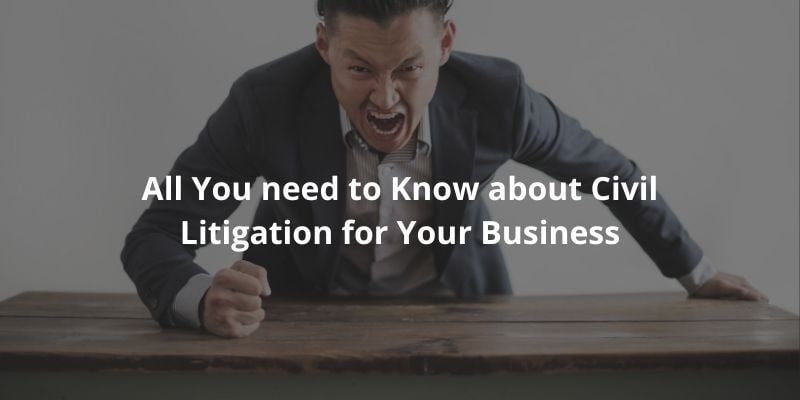Navigating Civil Litigation for Business: A Comprehensive Guide
31 Jan 2023
12 Mar 2021
min read

There are bound to be problems when running your business even with numerous measures in place to mitigate the risks (e.g. breach of contract, breach of fiduciary duties). Some of these disputes may require legal action to resolve, such as civil or commercial litigation. Civil litigation is the legal process by which one party seeks compensation from another, and where criminal charges and sanctions are not of interest. Commercial litigation is similar in nature but involves a dispute between businesses. This stands in contrast to civil lawsuits which merely involve a dispute between two individuals.

How do civil litigation and commercial litigation differ?
As briefly explained, civil litigation is a process in which civil matters are resolved in a court of law. (eg: employers and employees of a company). Typically, a person pursuing a civil claim seeks compensation in monetary form. Here are the most common cases involving civil litigation:
-
Employee compensation cases
-
Sexual discrimination, disability, race, and family status discrimination cases
-
Personal injuries
-
Product liability
-
Contractual disputes
On the other hand, commercial litigation is when businesses or companies are involved in a legal dispute. Some common disputes involving commercial litigation are:
-
Insurance Coverage
-
Partnership Disputes
-
Intellectual Property
-
Fraud and Misrepresentation
-
Tax Disputes
In this guide, we will be focusing on how civil litigation should be conducted within a business context.
A: Understanding your position
Step one: Identifying the problem or dispute

Legal disputes often do not arise overnight but are the result of an accumulation of events. This may require investigation into your communication history. Hence, you must have various policies to monitor, investigate, and prevent potential conflicts or disputes that may arise. This will provide a predictable framework for dealing with these problems and minimising disruptions to the work environment. For example, for whistleblowing, there may be a designated whistleblowing officer who deals with the company's reporting mechanism. Click here to see a sample template for a whistleblowing policy.
It is also understandable that sometimes not all problems are foreseeable meaning that there may not be existing policies or documents to deal with that problem. This is especially the case if the company is facing a potential civil dispute that has been newly established. In this situation, it would be important to seek legal advice from legal counsel and explain your situation. Your legal counsel will then be able to advise you on appropriate legal steps and other legal problems that may arise.
A company may also have to assess the potential magnitude of the problem. For example, if you have a pending employment dispute, the company's reputation may be affected. Sales figures may decrease. It is important to monitor your company's operation and use any means needed to mitigate damages from legal actions.
Step two: Identifying the stakeholders
You should also identify all the potential stakeholders when a dispute arises. For example, in a civil case involving product liability claims, your potential stakeholders are your customers, suppliers, manufacturers, and the marketing team. You will need to identify and inform their role and responsibilities regarding the pending civil litigation. Your marketing team may, for instance, need to refrain from using certain wording in their advertisement. You may also need to communicate with your suppliers and manufacturers about this pending product liability claim and make appropriate production adjustments.
The situation is always especially tricky if the defendant is a company, in which case, you may want to file a claim against the parent company instead of the subsidiary company. However, it may be difficult to do so if the parent company is not in the same jurisdiction. Due to the complexities which might arise and depending on your circumstances, you might have to consult your lawyer on the best course of action.
Step three: Seeking legal advice
.jpg)
Depending on the severity of the dispute, you may choose to hire an attorney to assist you with the pending civil litigation. If you choose to do so, you will want to find a lawyer specialising in the area concerned, for instance, a litigation lawyer, or a lawyer familiar with employment law or product liability. Depending on the magnitude of the dispute, you may choose to hire a larger firm that can accommodate your needs. This might be especially important if your litigation dispute crosses different jurisdictions, or if there are a lot of stakeholders involved in the process.
Alternatively, you may want to seek legal aid or pro bono services. This is especially suitable if you are a small, medium enterprise (‘SME’) as you may not have the sufficient financial means to litigate. A good place to start is the law society of your respective jurisdiction. Usually, they will provide information as to where you can book a free consultation or seek pro bono services.
In employment cases, the process is usually less formal, and some people may not choose to have any legal representation. However, as a business owner, you would probably still want to hire an employment specialist to assist you in such a sensitive issue.
Your lawyer may act as a negotiator between the parties involved. It may not always be necessary to go to a court or tribunal to resolve a civil litigation dispute. In fact, it is almost always more desirable to settle the dispute outside of the courts or tribunal as the litigation process can be very lengthy and costly. Your company may incur more losses due to the pending trial and judgement. Many business plans may have to be on hold, and it is a major impediment to many plans the business.
You could also consider an alternative to litigation such as arbitration which would be particularly beneficial if your claim involves stakeholders from all over the world. Many countries have signed the New York Convention, which makes arbitral awards readily enforceable worldwide. On the other hand, enforcing a judgment in a foreign country relies on mutual reciprocity agreements or recognition by local courts. Additionally, arbitral awards have the benefit of being final, with no appeal. Hence, if you would like to resolve your dispute quickly, arbitration is an attractive alternative to litigation.
Click here to here to access our guide to arbitration.
B: Beginning the Civil Litigation Process

Step one: Filing the claim
The first step is straightforward. All litigation must begin with the complainant filing a complaint and delivering the document to the respondent. Typically, the document will contain a deadline for the beginning of the litigation process. Click here to look at sample templates for the letter of claim.
Usually, parties follow the timeframe stated in the letter of claim to negotiate. As mentioned, it is more desirable to settle disputes outside, as it saves a lot of time and money.
Each jurisdiction has its own rules on the formalities of filing a claim. If you are looking to file a civil claim, you should contact your lawyer to ensure that you comply with all the relevant rules. Usually, a letter will be sent by post to the registered address of a company or the person's residential address. Subsequently, the complainant can file a claim with their local registry. The process becomes more complicated if the defendant is not located in the same area as the complainant. As a rule of thumb, you sue wherever the defendant is located. Hence, you may wish to contact different local courts depending on the parties involved in the litigation process.
Step two: Counterclaim
After you have received a letter of claim, you should carefully examine the content of the claims stated in the letter. Do not panic. Not all claims are substantiated and have a sufficient legal basis. Additionally, there are legal defences that you can rely on to respond to allegations. It would help if you talked to your lawyer regarding receiving a letter of claim and the ways to send a counterclaim or a defence letter in response to the letter of claim.
Step three: The discovery process

You have talked to all the potential stakeholders. You have attempted to settle, but all efforts did not yield any fruitful result. The period stated in the letter of claim has elapsed. You or the complainant formally files the complaint to the court. The other party may not have agreed to go to arbitration; hence you have no choice but to settle the dispute through litigation.
It is then necessary to gather information to prepare for the litigation process. This is commonly called the discovery process. This is a pre-trial process where one obtains and examines documents that they use and present as evidence in the court. Some of these documents may include affidavits (Witness statements). This process allows lawyers from each side to better prepare for the trial.
C: Going to Trial
Step one: Listing for trial
Each jurisdiction has its own procedures regarding how the local courts schedule timings for the trial. A common method would be inviting representatives of both parties to attend a ‘listing day’. The parties will confirm with the judge the representatives and the court's availability and agree on the hearing date.
Step two: Attending the hearing
Both parties need to attend the hearing on time and bring all the relevant documents. Relevant witnesses or expert witnesses can also give evidence at the court to help the judge understand the facts. Some jurisdictions even allow lawyers to assist their witnesses in preparing for the case – so check if this is the case for you.
Step three: Obtaining the judgment
Once the judge who has heard the case produces a judgment, parties can enforce the judgement. If the judge rules in favour of the complainant, the respondent would usually have to pay compensation or damages, as well as the cost of litigation.
If you are unsatisfied with the judgment or order, you can apply for an appeal. This is subject to certain limitations to appeal. For most common law jurisdictions, facts are decided by the court of the first instance. Appeals will only consider legal matters. You should consult with your lawyer on the prospects of success in appealing the case. Otherwise, it could be a waste of time and money.
Keywords:

